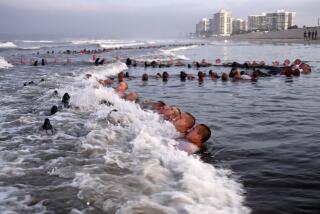British lied in sailor’s ’56 spying death, papers show
- Share via
LONDON — Secret documents released today showed that British authorities lied to cover up the fate of a naval commander who died during a 1956 scuba-diving spy mission near a warship used by Soviet leader Nikita S. Khrushchev.
Cmdr. Lionel “Buster” Crabb, a decorated Royal Navy veteran, disappeared while diving near Portsmouth in southern England on April 19, 1956. Navy chiefs said Crabb was presumed dead after failing to return from a dive to test underwater equipment.
The press and public doubted that was the full story. Russian warships were in Portsmouth harbor at the time as part of Khrushchev’s goodwill visit. Crew members reported seeing a diver near one of the ships, prompting an official Soviet complaint to the British government.
It was widely assumed that Crabb was inspecting the ship on behalf of the spy agency MI6 when something went wrong.
According to the documents, the navy did not mount a rescue operation for Crabb because the mission was secret and “a search could not be carried out beside the Russian warships.”
Amid rumors in the press and questions in Parliament, Prime Minister Anthony Eden told lawmakers at the time that “it would not be in the public interest to disclose the circumstances in which Commander Crabb is presumed to have met his death.”
The secret documents, released to the National Archives under the Freedom of Information Act, give weight to the spying claim.
The file includes a sworn statement by a Royal Navy lieutenant commander who recounts how Crabb asked whether he would participate in a dive “entirely unofficially and in a strictly private capacity.” The man -- whose name has been deleted -- said he was told not to inform his navy superiors.
The man said he helped Crabb put on his equipment before the dive, which took place “south of the Southern Railway Jetty in Portsmouth Dockyard” -- near the Soviet ships -- rather than in Stokes Bay, the location given by naval officials.
Other papers reveal high-level nervousness when, more than a year after Crabb disappeared, a headless corpse clad in a diving suit washed ashore. A coroner’s inquest concluded that it was Crabb’s body but couldn’t determine the cause of death.
The dossier includes a handwritten note explaining that naval headquarters did not want the unnamed lieutenant commander who assisted Crabb to appear at the inquest, lest information come out that is “contrary to what the Admiralty has said as a cover story.”
Archivist Howard Davies said the extent of the official cover-up suggested there were more details about the case to emerge.
More to Read
Sign up for Essential California
The most important California stories and recommendations in your inbox every morning.
You may occasionally receive promotional content from the Los Angeles Times.













